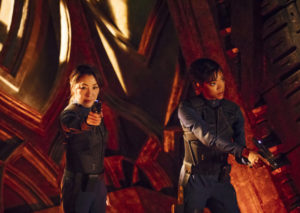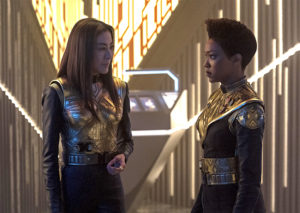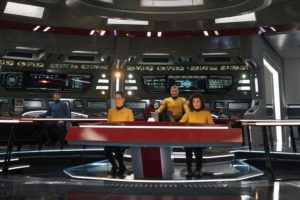If Picard represented a brave new world of solid storytelling for Star Trek after more than 35 years, Discovery is, well, the same old thing, lightly refurbished to meet modern dramatic television sensibilities. Since I subscribed to CBS All Access to watch Picard, I decided to give Discovery another try, despite the first episode having been so bad that I mocked it live on Twitter.
Overall the show is, well, better than that first episode, but not very good. The first season is very hard going, partly focused around a war with the Klingons, but also spending several episodes in a strange digression. The second season is more coherent and generally improved, but still kind of disappointing. The general feel of the series is one of flamboyant and nonsensical plotting, without much of a message. The characters are generally pretty flat. Overall it feels very much of a piece with NextGen and the later series, albeit with a rougher edge, but that’s not really a good thing.
Lots more – with spoilers – after the cut:
The series is nominally based around the character of Michael Burnham (Sonequa Martin-Green), who was the first officer on the USSÂ Shenzhou under Captain Philippa Georgiou (Michelle Yeoh) until she committed mutiny by wanting to strike at a Klingon force to deter them from attacking in that terrible first episode. The Shenzhou is destroyed, Burham is court-martialed, but she’s given a reprieve and a position as a science specialist on the USS Discovery under Captain Gabriel Lorca (Jason Isaacs). The Discovery has a prototype jump drive (excuse me, “spore drive”) which can jump directly to any location in the galaxy. The series takes place about a decade before the original Star Trek series, so a couple of years after the episode “The Cage” with Captain Christopher Pike.
There’s already a lot of nonsense in here. I’ve become less and less wedded to continuity in big media franchises over time, partly because I know the owning studios don’t care, and partly because of the argument that continuity faces the writers to be enslaved to the worst elements of earlier shows. That said, there’s a lot here that is basically unsatisfying. Any series set before the original, or really any time prior to the end of the original cast movies, has to be making some sort of point about the franchise, or else why set it in that time period? And Discovery makes very little sense as a prequel to the original series: Why does the Discovery look and feel so different from the Enterprise in “The Cage”? Why are the uniforms different? (This really annoys me because “uniform roulette” is a particularly stupid and visual symbol of the studios’ lack-of-caring about previous series.) Why have we never heard of the Discovery or its magical spore drive before? What is this nonsense with the biologically-powered spore drive? Why do the Klingons look and act different, again? It all feels basically gratuitous, and frankly the show would have made more sense if it were set a few decades after Picard, where its advanced technology and different look would feel more natural.
The first season is mostly concerned with the war with the Klingons, which is basically pretty dumb, a lot of cheap story moments which come to nothing. The biggest nothing is Lieutenant Ash Tyler (Shazad Latif), who is a Klingon surgically changed to resemble a human officer, in a supremely pointless infiltration of Starfleet. Latif does his best with a role whose dramatic effect is mostly conjured out of thin air, but it’s not enough.
Honestly getting through the first season was a struggle, but it picked up in episode 10 when the Discovery is transported to the Mirror Universe. Putting aside the continuity confusion this introduces, it’s a fairly tense few episodes, where we learn that Lorca is himself from the Mirror Universe, has been using Burnham and the Discovery to get back, and stages a coup against the Emperor – who is the counterpart of Captain Georgiou! Michelle Yeoh chews all the available scenery and is clearly having a blast playing the Emperor, and pretty much out-acts everybody else on the show. The high point of the first season is when she and Burnham face down Lorca and his right hand and dispatch them – a scene which parallels the fight Burnham and the other Georgiou had against the Klingons in the second episode, but the writing is not self-aware enough to do anything with this.
After this, the last two episodes resolving the Klingon war are deeply anticlimactic, to the point of “who cares?” Burnham gives a little speech which is supposed to indicate her growth over the season since her mutiny, but it’s pretty ham-handed. A weak end to a rough season.
People had been telling me that the second season was better, and… it was. Though it wasn’t great. Captain Christopher Pike (Anson Mount) takes over command of the Discovery (the Enterprise having been damaged and needing long-term repairs), and leads the crew on a quest to determine the meaning of seven signals detected around the galaxy, and a “red angel” connected to them. Burnham’s step-brother Spock (Ethan Peck) has had visions of them since he was a child, and is a fugitive from Starfleet.
This season at least has more of an exploratory feel – a “discovery” feel, if you will – than the first season, and has a few good episodes in this vein, such as “New Eden”, about a transplanted colony of 21st-century humans. It starts to get a bit tedious as we learn who the red angel is, and the battle against the artificial intelligence behind Section 31 – a covert arm of Starfleet which Georgiou now works for – which will destroy all human life. Again, the writers largely take the straightforward action choice, not really examining what an AI of this magnitude really means. It culminates in a sequence in which the Discovery – minus the Enterprise members – goes through a time rift 900 years into the future, a very slow 2-part episode which could have been less than half as long. Consequently Starfleet buries the very existence of Discovery, a supremely unconvincing effort to explain why we never hear about it in series that take place later.
And we never do find out why the Enterprise has the distinctive colorful uniforms, while Discovery and the rest of Starfleet are in drab retro outfits.
To be sure, Discovery has some tense moments, but it’s also a slog. It feels very much like The Next Generation in its silly situations, ridiculous technical solutions, and flat characters. The higher level of action is welcome, but it’s not deployed very well as the writing is generally pretty shaky.
The crew of Discovery is… okay. Lorca and Burnham are both kind of generic figures, played in a generic manner. Sylvia Tilly (Mary Wiseman) is amusingly effervescent, and is the only character who really has organic character growth as she strives towards someday becoming a captain. Saru (Doug Jones) feels like the token alien, and I didn’t find him especially interesting, kind of a small permutation on Data. Engineer Paul Stamets (Anthony Rapp) has an evolution from an unlikeable egotist early on to a warmer character struggling with the ramifications of his strange life; Rapp’s performances are often excellent, but his character’s development feels contrived, especially in the first season.
The Enterprise crew fares a little better than the Discovery‘s: None of Pike, Number One (Rebecca Romijn) and Spock feel much like the ones we met in the original series, but they’re all entertaining enough in their own way. Number One’s snarky demeanor is especially welcome. Mounts doesn’t look much like Jeffrey Hunter, but then not many do; Pike feels more like the action-hero variant of Picard. Peck feels like a believable permutation of Spock when he has the beard and is focused on his quest, but clean-shaven with the normal Starfleet outfit he doesn’t really resemble Leonard Nimoy’s Spock in appearance or demeanor.
After watching these two seasons, we watched Short Treks, a series of shorter stories mostly based around Discovery, and they are, in general, much better than the main series. Of particular note is “Calypso”, in which a man in an escape pod a thousand years in the future is rescued by Discovery, which is empty save for its sentient computer. The pair help each other come to terms with themselves. It’s a charming and eerie story, and hopefully we find out how the ship got to this point. The second season has multiple strong episodes, including two based around the Enterprise crew from season two, an animated short about the first Enterprise throughout its existence, and a prelude to Picard. But almost every Short Trek is worth watching, the weakest one perhaps being Saru’s story of leaving his people to join Starfleet.
Overall I would rate Discovery as a little better than the 80s & 90s crop of Trek series, but still on the weaker side. It lacked the humanity of the original series, and the direction and depth of character and emotion of Picard. The third season will take place 900 years in the future, in the 31st century, beyond even the time of the “temporal Cold War” from Enterprise. There are a lot of directions they can go, though the trailer makes it look like it’s going to use the “small group of humans inspired by Starfleet against a cruel universe” trope. Since this jump means they will finally – finally – get past the era of NextGen, I will probably watch to see if it’s more imaginative than I suspect.
But honestly if they just replace the damnably dull theme music it would be 100% improvement.



